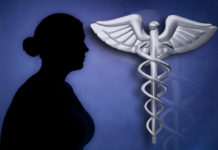
Even as reports emerge about a general trend of early menarche – first menstrual period – new study suggests that starting periods early–before the age of 12–is linked to a heightened risk of heart disease and stroke in later life. The analysis of data from the UK Biobank study, has been published online in the journal Heart.
It is one of several reproductive risk factors, including early menopause, complications of pregnancy, and hysterectomy, that seem to be associated with subsequent cardiovascular disease, the findings show. Previous research has suggested that certain reproductive risk factors may be linked to an increased risk of heart disease or stroke, but the findings have been somewhat mixed.
Similarly, those who went through the menopause early (before the age of 47) had a 33 percent heightened risk of cardiovascular disease, rising to 42 percent for their risk of stroke, after taking account of other potentially influential factors.
Analysis of the data showed that after taking account of potentially influential factors, women who had started having periods before the age of 12 were at 10 percent greater risk of cardiovascular disease than those who had been 13 or older when they started.
Similarly, those who went through the menopause early (before the age of 47) had a 33 percent heightened risk of cardiovascular disease, rising to 42 percent for their risk of stroke, after taking account of other potentially influential factors.
In a bid to clarify any potential associations, the research team drew on data from the UK Biobank, a large population based study of more than half a million men and women up to the age of 69, and recruited between 2006 and 2010.

Participants filled in questionnaires on their lifestyle, environment, and medical history, which included a wide range of reproductive factors. They also took tests to assess their physical and functional health, and provided urine, blood, and saliva samples.
In all, the health of 267,440 women and 215,088 men–none of whom had cardiovascular disease when they entered the study–was tracked up to March 2016 or until they had their first heart attack or stroke, whichever came first.
The average age of the women at the start of the study was 56, and around half (51%) came from the most affluent third of the UK population. Six out of 10 had never smoked.
The average age at which they had started having periods was 13.
During a monitoring period spanning around 7 years, 9054 cases of cardiovascular disease were recorded, a third (34%) of which were in women. This included 5782 cases of coronary artery disease (28% women) and 3489 cases of stroke (43% women).
Previous miscarriages were associated with a higher risk of heart disease, with each miscarriage increasing the risk by 6 percent. And stillbirth was associated with a higher risk of cardiovascular disease in general (22%) and of stroke in particular (44%).
Hysterectomy was linked to a heightened risk of cardiovascular disease (12%) and of heart disease (20%). And those who had had their ovaries removed before a hysterectomy were twice as likely to develop cardiovascular disease as those who hadn’t had these procedures.
Young age at first parenthood seemed to be another risk factor, with each additional year of age lessening the risk of cardiovascular disease by around 3 percent.












